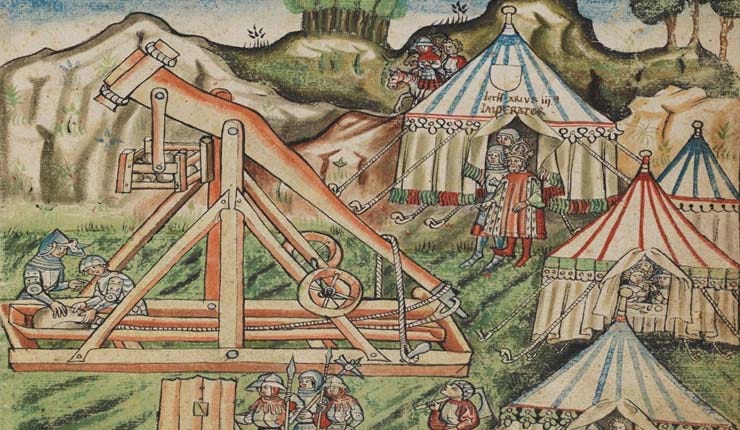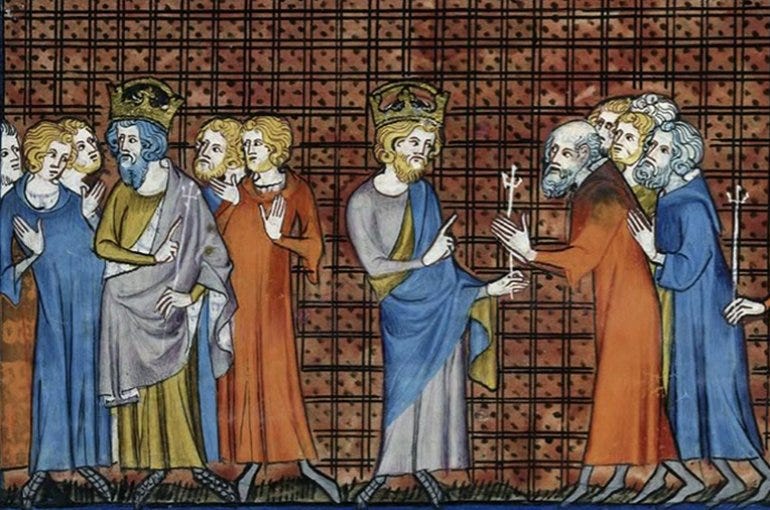A dense essay to refute the "revisionist" view on the Dark Ages
Review of The Fall of Rome And the End of Civilization by Bryan Ward-Perkins
This is less a narrative history than an essay taking aim at current academic fashion to portray the first few centuries of the Dark Ages not as an abrupt and brutal discontinuity, but as a prolonged continuation of "late antiquity", in which much of Roman civilization was absorbed and used to sustain the new masters of Western Europe, the Goths, Franks, and Anglo-Saxons. The author argues for the traditional view – that Rome fell, that a civilization died, that the barbarians were barbaric.
The first half of the book seeks to prove that the fall of Rome was essentially military: a number of barbarian tribes invaded the western portion of the empire, causing wide spread devastation as they marched through Italy, then France and Spain, eventually making their way to Northern Africa. He emphasizes that this undermined the tax base that was necessary to support the professional military, leading to a complete breakdown of the systems of protection. (Oddly, Ward-Perkins hardly mentions that their invasion of Africa also cut off the flow of grain to Rome, a huge factor in my view in the disintegration of the political order.) The author also strives to prove that many of Rome's elite were disenfranchised in the process, stripped of their lands, their laws, and authority. This counters the more idyllic version that many academics currently prefer. That being said, he also acknowledges that there was much cooperation, oases of peace for prolonged periods, etc.
The second half of the book is far more interesting. Here, Ward-Perkins brings in archaeological evidence that there was a massive economic breakdown, leading directly to sharply lower living standards in the Western Roman Empire and with that, the loss of skills, habits, and institutional structures that went with what can only be called a civilization (literacy, the rule of law, a tradition of tolerance, entertainment, etc.). To do so, he looks at the disappearance of high-quality pot shards (an indication of long-distance trade, hence economic specialization and efficiencies in accordance with Richardo's classic economic ideas), tiled roofs, and minted coin. Rather than trade and a functioning global economy, these developments signaled a return to autarky and strictly local exchanges, requiring peasants to produce everything themselves for a greatly reduced standard of living, a virtual autarky. In my reading, this is one of the best archaeological reconstructions of the antique economy that I have yet seen. It alone is worth the price of entry.
Ward-Perkins concludes the book with a fascinating discussion on how current events often influence the perception of historians. As such, in the 1930s, it was fashionable to view the Germanic tribes as brutal destroyers, while the Romans were lone defenders not just their civilization, but also Christian ideals. Today, he argues, with Germany as a responsible partner in the EU, fashion has shifted to see their antique predecessors a willing participants in the maintenance of the remnants of Roman civilization. All of these views, he concludes, require more nuance than is fashionable today. While I am a bit uncomfortable with this kind of reductionism to epiphenomena, it is worth considering. It adds a great deal of nuance to the debate. Finally, he also criticizes the tendency of many contemporary historians to concentrate on subjective states of mind – in particular Christian ones – at the expense of economics and ownership.
The book is written at the early graduate level, making many assumptions about the readers' knowledge levels and trusting them to get through some pretty dense inductive reasoning. While many details are mentioned, there is little basic introduction to classical archaeology, economics, and military history; he does not even define what exactly he means by civilization. That being said, because I have read many of the books he is seeking to counter, this is an absorbing intellectual exercise for those who’d wish to make it, of course.
I would recommend this book warmly to those with a scholarly bent. Indeed, I find his arguments convincing and trust his judgement. The book is also superlatively written.
Related reviews:
How Europe became Europe
This wonderful book is about the end of the Dark Ages, when trends were aligned in such a way that Europe finally began to overcome the long decline and chaos that followed the Roman Empire's disintegration. During this period (950 to 1350 CE), the vast migrations and fluidity of the early middles ages ended decisively, allowing stable states, a reforme…
Excellent survey history of the dark ages: academic, accessible, dense
While comprehensive, this survey history neither gets bogged down in obscure scholarly debates nor over-simplifies controversies on sources or interpretation for lay readers. Every page made me want to learn more in specialized sources. A demanding read, its level is advanced undergraduate or early graduate school.
Revisionist view of the Dark Ages
This is a revisionist exercise that attempts to de-bunk the visions of post-Roman collapse and chaos that were disseminated by distant contemporary Christian authors. What the author adds that is new, at least to me, is to marshal archaeological evidence to prove that the dark ages do not represent a radical discontinuity, but rather evolved naturally o…







“Why the West Rules…For Now”, by Ian Morris provided strong for this same conclusion. It is very worth reading, even for non-academic audiences.